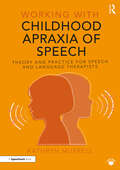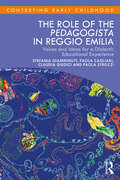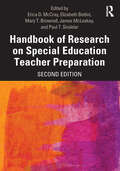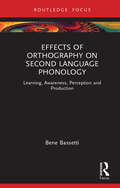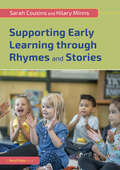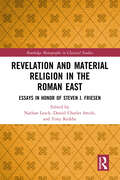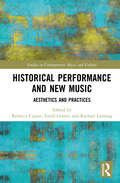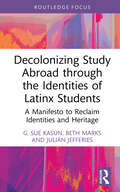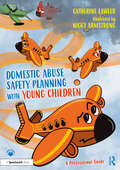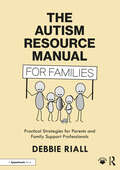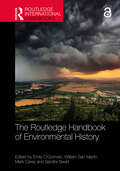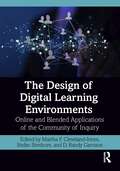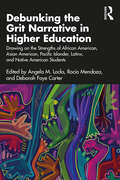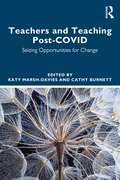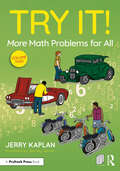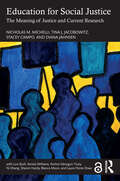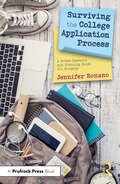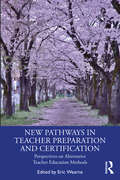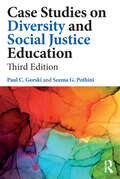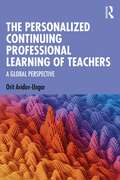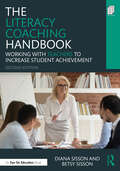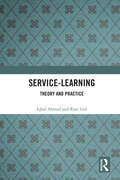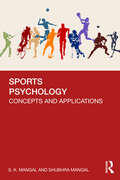- Table View
- List View
Working with Childhood Apraxia of Speech: Theory and Practice for Speech and Language Therapists (Working With)
by Kathryn MurrellThis resource will lead the reader through the practicalities of assessment, diagnosis, and therapeutic intervention for children of all ages with features of childhood apraxia of speech. It provides the theory and underlying principles upon which to work with children who have this fascinating but challenging disorder in collaboration with families and schools. Chapters are clearly laid out, with hands on activities for intervention and helpful summaries. There is a focus on alternative and augmentative means of communication and multidisciplinary working, as well as a wealth of case studies and teaching notes for training other professionals. Fresh ways of working are addressed, such as the use of teletherapy and other techniques such as group therapy and the consultative approach are discussed. Key features include: A theoretical overview of current thinking about childhood apraxia of speech A structured assessment format with a chapter specifically focused on how to take a detailed speech sample Clear guidance on how to make a differential diagnosis How to spot early indicators of childhood apraxia of speech Advice sheets for parents and schools Downloadable record forms for case history taking and assessment. This book can be read cover to cover or dipped into for quick and easy therapy ideas and is presented in an easy-to-read format, with chapters broken down into bite-sized chunks. It is an essential handbook for all speech and language therapists and students, whatever their level of experience.
Working with Childhood Apraxia of Speech: Theory and Practice for Speech and Language Therapists (Working With)
by Kathryn MurrellThis resource will lead the reader through the practicalities of assessment, diagnosis, and therapeutic intervention for children of all ages with features of childhood apraxia of speech. It provides the theory and underlying principles upon which to work with children who have this fascinating but challenging disorder in collaboration with families and schools.Chapters are clearly laid out, with hands on activities for intervention and helpful summaries. There is a focus on alternative and augmentative means of communication and multidisciplinary working, as well as a wealth of case studies and teaching notes for training other professionals. Fresh ways of working are addressed, such as the use of teletherapy and other techniques such as group therapy and the consultative approach are discussed.Key features include: A theoretical overview of current thinking about childhood apraxia of speech A structured assessment format with a chapter specifically focused on how to take a detailed speech sample Clear guidance on how to make a differential diagnosis How to spot early indicators of childhood apraxia of speech Advice sheets for parents and schools Downloadable record forms for case history taking and assessment. This book can be read cover to cover or dipped into for quick and easy therapy ideas and is presented in an easy-to-read format, with chapters broken down into bite-sized chunks. It is an essential handbook for all speech and language therapists and students, whatever their level of experience.
The Role of the Pedagogista in Reggio Emilia: Voices and Ideas for a Dialectic Educational Experience (Contesting Early Childhood)
by Stefania Giamminuti Paola Cagliari Claudia Giudici Paola StrozziThe Role of the Pedagogista in Reggio Emilia offers unparalleled insight into dialectic encounters between teachers, pedagogistas, and atelieristas in the world-renowned municipal early childhood services of the city of Reggio Emilia. It sheds light on the system and culture that cares for and sustains an enduring educational experience, for the common good. Emerging from a collaborative research project with Reggio Children and the Preschools and Infant-toddler Centres – Istituzione of the Municipality of Reggio Emilia, this book features in-depth observations of pedagogistas, teachers, and atelieristas, as well as interviews with key figures in Reggio Emilia. Children’s learning is thoughtfully emphasised, as the authors render the inextricable connection between theory-practice-research, framing documentation and progettazione as artful collective experimentation. The authors illuminate how Reggio Emilia’s system sustains reciprocal professional formation through progettazione, contesting dominant marketplace discourses of early childhood education as a commodity and re-imagining settings driven by values of reciprocity, artistry, culture, and the common good. By troubling conventional views on education and care, professionalism of teachers, and educational leadership, this book will appeal to all those who long for something different and hope to shift the field of possibility for early childhood education culturally, socially, pedagogically, and politically. It will be a key resource for teachers, leaders, policy makers, and scholars in the whole field of education.
Handbook of Research on Special Education Teacher Preparation
by Erica D. McCray Elizabeth Bettini Mary T. Brownell James McLeskey Paul T. SindelarThe new edition of this landmark text expands our current understanding of teacher education broadly by providing an in-depth look at the most up-to-date research on special education teacher preparation. Offering a comprehensive review of research on attracting, preparing, and sustaining personnel to effectively serve students with disabilities, it is fully updated to align with current knowledge and future perspectives on special educator development, synthesizing what we can do to continue advancing as a field. The Handbook of Research on Special Education Teacher Preparation is a great resource not only to special education faculty and the doctoral students they prepare, but also to scholars outside of special education who address questions related to special education teacher supply, demand, and attrition.
Effects of Orthography on Second Language Phonology: Learning, Awareness, Perception and Production (Routledge Research in Language Education)
by Bene BassettiThis is the first book devoted to the effects of orthographic forms (spellings) on second language phonology. Written by one of the pioneer researchers in the field, the book provides an authoritative overview of the effects of spellings on the perception, production, awareness, learning and teaching of sounds and spoken words in a second language. Using the findings and implications from a large-scale research project at its centre, the book reveals that English consonants spelled with double letters lead Italian learners and users of English as a second language to perceive, produce, classify, and learn English consonants as geminates (long consonants). Presenting a narrative of a second language research project, and discussing its implications, the book will be of interest to scholars and researchers in the fields of orthography, phonology, and speech and language perception. Language teaching practitioners will also find the book useful.
Supporting Early Learning through Rhymes and Stories
by Sarah Cousins Hilary MinnsThis book shows how adults can bring rhymes and stories to life with young children and support children’s early steps in communication and literacy. Focusing on the use of rhythm, rhyme and repetition in nursery rhymes and traditional tales from around the world, it provides a wealth of practical ideas for using rhymes and stories one-on-one, in small groups or with whole classes. Drawing from the culmination of their many years of combined experience, the two authors link the theoretical understanding of language and communication with the practical use of rhymes and oral storytelling in the classroom, nursery and at home. Early chapters (or Part I) provide a rationale for using rhyme, rhythm and repetition to inspire children to play with words and develop a love of language, building a foundation for literacy learning. Part II consists of ten lively chapters featuring original and re-imagined traditional fairy tales, containing: Accompanying rhymes to use with children Key themes including friendship, kindness, compassion and generosity Follow-up activities activities for extending children’s vocabulary, building their confidence and developing critical thinking Suggestions of using voices, facial expressions, gestures, props and puppets to enrich children’s emotional, imaginative and intellectual experience This delightful and practical book will be valuable reading for all adults wanting to support young children’s creative learning through enjoyable and valuable experiences.
Revelation and Material Religion in the Roman East: Essays in Honor of Steven J. Friesen (Routledge Monographs in Classical Studies)
by Nathan Leach Daniel Charles Smith Tony KeddieThis collection of essays from a diverse group of internationally recognized scholars builds on the work of Steven J. Friesen to analyze the material and ideological dimensions of John’s Apocalypse and the religious landscape of the Roman East. Readers will gain new perspectives on the interpretation of John’s Apocalypse, the religion of Hellenistic cities in the Roman Empire, and the political and economic forces that shaped life in the Eastern Mediterranean. The chapters in this volume examine texts and material culture through carefully localized analysis that attends to ideological and socioeconomic contexts, expanding upon aspects of Friesen’s research and methodology while also forging new directions. The book brings together a diverse and international set of experts including emerging voices in the fields of biblical studies, Roman social history, and classical archeology, and each essay presents fresh, critically informed analysis of key sites and texts from the periods of Christian origins and Roman imperial rule. Revelation and Material Religion in the Roman East is of interest to students and scholars working on Christian origins, ancient Judaism, Roman religion, classical archeology, and the social history of the Roman Empire, as well as material religion in the ancient Mediterranean more broadly. It is also suitable for religious practitioners within Christian contexts.
Historical Performance and New Music: Aesthetics and Practices
by Rebecca Cypess, Estelí Gomez, and Rachael LansangThe worlds of new music and historically informed performance might seem quite distant from one another. Yet, upon closer consideration, clear points of convergence emerge. Not only do many contemporary performers move easily between these two worlds, but they often do so using a shared ethos of flexibility, improvisation, curiosity, and collaboration—collaboration with composers past and present, with other performers, and with audiences. Bringing together expert scholars and performers considering a wide range of issues and case studies, Historical Performance and New Music—the first book of its kind—addresses the synergies in aesthetics and practices in historical performance and new music. The essays treat matters including technologies and media such as laptops, printing presses, and graphic notation; new music written for period instruments from natural horns to the clavichord; personalities such as the pioneering singer Cathy Berberian; the musically “omnivorous” ensembles A Far Cry and Roomful of Teeth; and composers Luciano Berio, David Lang, Molly Herron, Caroline Shaw, and many others. Historical Performance and New Music presents pathbreaking ideas in an accessible style that speaks to performers, composers, scholars, and music lovers alike. Richly documented and diverse in its methods and subject matter, this book will open new conversations about contemporary musical life.
Decolonizing Study Abroad through the Identities of Latinx Students: A Manifesto to Reclaim Identities and Heritage (Routledge Research in Decolonizing Education)
by G. Sue Kasun Beth Marks Julián JefferiesThis book counters the common understanding of study abroad in Latin America as a White and middle-class colonizer practice and re-imagines it to fit the needs of Latinx immigrant/transnational higher education students. The book centers Latinx youth inhabiting familial heritage spaces as a pathway toward a deeper understanding of themselves as racialized and colonized individuals, reframing study abroad for Latinx youth as a way for them to reclaim, negotiate, and strengthen their own immigrant/Latino/a/Chicano/a and other identities. The text is undergirded by a theoretical argument based on decolonial methods in education and Critical Race Theory and draws on counter-stories, rich descriptive interviews, and participant observations across 26 years of combined experience leading educational trips to Latin America. The authors analyse, reflect, and critique the field of study abroad to advocate for the rethinking of recruitment strategies, pedagogical experiences, language practices, and community partnerships that include Latino/a, Chicano/a, and Latin American immigrant youth and their families from the beginning. They present a new conceptualization of Latinx immigrant students studying abroad as engaging opportunities for reclaiming heritage, culture, histories, and language, for exploring a sense of identity and obligation to Latin communities, and for healing from the effects on Whiteness and ethnocentrism in ways online possible outside the continental United States. As such, the book shifts the gaze of the entire field toward new diversities showcasing examples of how educational trips abroad can be re-envisioned to suit the needs of ethnically minoritized students in the United States. This volume will appeal to scholars, researchers, educators, and education officers working across higher education and international education, looking for contemporary, global. and forward-thinking decolonial methodologies.
Domestic Abuse Safety Planning with Young Children: A Professional Guide (Safety Planning with Young Children)
by Catherine LawlerThis guidebook is an essential companion to the Pilgrim’s Bumpy Flight story and is designed to be read by professionals to ensure the effective and safe use of the storybook. Pilgrims Bumpy Flight has been created to help young children aged 5–7 experiencing domestic abuse, to explore the concepts of physical and emotional safety. Safety planning with a child offers a way to help them vocalise their feelings and understand what to do when something does not feel right. The professional guide will help supporting adults facilitate safety planning that is experienced as emphatically curious, safe and where the child’s opinion matters. It provides up-to-date information on domestic abuse, childhood trauma, practice tips and how to complete a safety plan with a young child using the storybook as the key vessel of communication and exploration. Key features include: • Accessible information about domestic abuse and coercive control based on the latest research. • Guidance around direct work and safety planning with young children. • Practical activities building off Pilgrim’s story, including printable material. • Things to consider and ways to use the storybook to facilitate a conversation with a child, as well as page-by-page helpers notes on the narrative. • A comprehensive list of helplines and organisations in place to support adult victims/survivors of domestic abuse. Used alongside the storybook, this professional guide is a crucial tool for the early years sector, education staff and those working in children’s services, including safeguarding officers, family support workers, social workers and children’s IDVAs. Both books should be used in tandem with agency policy, procedure and guidance.
The Autism Resource Manual for Families: Practical Strategies for Parents and Family Support Professionals
by Debbie RiallThe Autism Resource Manual for Families is a treasure trove of practical, realistic and achievable strategies to support neurodivergent young people and their families with everyday life. Clearly laid out for easy use and access, it explains autism in context and provides ideas that are relevant not just for parents and carers, but for family support workers, social workers and family intervention teams. The resource covers a wide range of situations and offers an array of supports, with key topics ranging from anxiety, behaviour, and communication, to socialising, family life, and moving towards independence. With the lived experiences of parents and autistic children and young people in mind, this empowering manual includes: A wealth of situations from daily life, clearly addressed with examples of how autistic individuals may experience these and practical strategies for effective support Encouragement for parents and mini mantras for autistic children and young people to use in different situations Strategies for supporting autistic children in daily family life, including working with siblings, family holidays and eating out Advice for helping autistic young people through school, including attendance, homework and after-school exhaustion Guidance on initiating and carrying out productive conversations, as well as downloadable resources for visual conversation support. This book will be an essential tool for parents and carers of neurodivergent children and young people, as well as family or parent support workers and family intervention teams. It will also be valuable reading for pastoral teams, CAMHS, and social workers supporting these families.
The Routledge Handbook of Environmental History (Routledge International Handbooks)
by Emily O’Gorman William San Martín Mark Carey Sandra SwartThe Routledge Handbook of Environmental History presents a cutting-edge overview of the dynamic and ever-expanding field of environmental history. It addresses recent transformations in the field and responses to shifting scholarly, political, and environmental landscapes. The handbook fully and critically engages with recent exciting changes, contextualizes them within longer-term shifts in the field, and charts potential new directions for study. It focuses on five key areas: Theories and concepts related to changing considerations of social justice, including postcolonial, antiracist, and feminist approaches, and the field’s growing emphasis on multiple human voices and agencies. The roles of non-humans and the more-than-human in the telling of environmental histories, from animals and plants to insects as vectors of disease and the influences of water and ice, the changing theoretical approaches and the influence of concepts in related areas such as animal and discard studies. How changes in theories and concepts are shaping methods in environmental history and shifting approaches to traditional sources like archives and oral histories as well as experiments by practitioners with new methods and sources. Responses to a range of current complex problems, such as climate change, and how environmental historians can best help mitigate and resolve these problems. Diverse ways in which environmental historians disseminate their research within and beyond academia, including new modes of research dissemination, teaching, and engagements with stakeholders and the policy arena. This is an important resource for environmental historians, researchers and students in the related fields of political ecology, environmental studies, natural resources management and environmental planning. Chapters 9, 10 and 26 of this book are freely available as a downloadable Open Access PDF at http://www.taylorfrancis.com under a Creative Commons Attribution-Non Commercial-No Derivatives (CC-BY-NC-ND) 4.0 license.
The Design of Digital Learning Environments: Online and Blended Applications of the Community of Inquiry
by Cleveland-Innes, Martha F. Stefan Stenbom D. Randy GarrisonThe Design of Digital Learning Environments provides comprehensive guidelines for creating and delivering high-quality online and blended learning experiences in higher education. With increasing numbers of students engaged in partially or fully digital education, graduate students preparing for design, development, or faculty roles need fresh, practical applications of cutting-edge research and theory. This textbook uses the Community of Inquiry framework, an influential and invaluable pedagogical model focused on deep learning, to aid educators in forging meaningful, collaborative connections with students engaged in digitally supported multi-modal learning in colleges and universities, MOOCs, and lifelong learning initiatives. Across five parts, the book covers the basic structure, concepts, terminology, and history of the Community of Inquiry; principles for designing and delivering digital courses; design for specific course conditions; applications of learning activities guided by the framework; and current limitations and directions for further research.
Debunking the Grit Narrative in Higher Education: Drawing on the Strengths of African American, Asian American, Pacific Islander, Latinx, and Native American Students
by Angela M. Locks Rocío Mendoza Deborah Faye CarterDebunking the Grit Narrative in Higher Education examines pressing structural issues currently impacting African American, Asian American, Pacific Islander, Latinx, and Native American students accessing college and succeeding in U.S. postsecondary environments. Drawing from asset-based work of critical race education scholars such as Yosso, Ladson-Billings, and contributing author Solórzano, the authors interrogate how systems and structures shape definitions of academic merit and grit, how these systems constrain opportunities to attain access and equitable educational outcomes, and challenge widely held beliefs that Students of Color need grit to succeed in college. Dominant narratives of educational success and failure tend to focus mostly on individual student effort. Contributing authors explore the myriad ways that institutional structures can support Students of Color utilizing their strengths through critical perspectives, asset-based, anti-deficit perspectives to access postsecondary environments and experience success. Scholars, scholar-practitioners, students affairs professionals, and educational leaders will benefit from this timely edited book as they work to transform postsecondary institutions into entities that meet the needs of Students and Communities of Color.
Teachers and Teaching Post-COVID: Seizing Opportunities for Change
by Katy Marsh-Davies Cathy BurnettFeaturing a broad swathe of academic research and perspectives from international contributors, this book will capture and share important lessons from the pandemic experience for teaching practice and teacher learning more broadly. Looking at core teaching values such as the facilitation of learning, the promotion of fairness and equality, and community building, the book centres the records of teachers’ experiences from diverse educational phases and locations that illuminate how the complexity of teaching work is entangled in the emotional, relational, and embodied nature of teachers’ everyday lives. Through rich, qualitative data and first-hand experience, the book informs the decisions of teachers and those who train, support, and manage them, promoting sustainable, positive transformation within education for the benefit of educators and learners alike. This book will be of use to scholars, practitioners, and researchers involved with teachers and teacher education, the sociology of education, and teaching and learning more broadly. Policy makers working in school leadership, management, and administration may also benefit from the volume.
Try It! More Math Problems for All
by Jerry KaplanThis is not your typical math book. Try It! More Math Problems for All is the second of three collections of offbeat, open-ended problems designed to make even the most math-averse student excited about working through these challenging yet accessible problems. These are 25 new, illustrated problems varying in difficulty. They will motivate your students to think creatively on their own and to engage in teamwork. The Hints and Solutions section guides you to probe, suggest, and encourage students to explore even their most unusual insights on the way to a solution. And when students solve a problem, you will see and hear their accomplishments. Perfect for any math classroom, club, after school activity, or coaching session, Try It! celebrates not only the destination, but the journey, giving students a chance to think differently, and, above all, have fun! Can’t get enough? Volumes 1 and 3 in the series are also available at Routledge.com. Optional Student Workbook Packs In addition to this teachers' guide, companion student workbooks are available in packs of ten. The student workbooks feature ample room for student responses and notes, make reviewing and providing feedback on student work easy, provide students with a quick reference to use during discussions, and they save time — there is no need to reproduce student handouts.
Education for Social Justice: The Meaning of Justice and Current Research
by Nicholas M. Michelli Tina J. Jacobowitz Stacey Campo Diana JahnsenEducation for Social Justice is a statement of the role of education in promoting social justice. Drawing on research, this book explains what social justice is, presents the argument that democracy requires a commitment to social justice, and shows what action steps need to be taken to ensure social justice is achieved within education and society more broadly. The text presents research and concrete examples to examine the social justice issues facing society today. Some of the social justice topics explored include access to higher education, informal education (such as museums and art galleries) and adequate civic education, and racial and gender discrimination within education, as well as access to healthcare and the vote, which impact students’ learning. It explores specific research and action for each of these elements and, at the end of the book, provides potential paths forward to improve social justice outcomes. This timely book encourages readers to consider what we can do to enhance social justice in education and society. It is important reading for pre-service teachers, particularly those studying teaching for social justice, social studies education, and educational policy and politics, as well as for in-service teachers who want to make a difference.
Education for Social Justice: The Meaning of Justice and Current Research
by Nicholas M. Michelli Tina J. Jacobowitz Stacey Campo Diana JahnsenEducation for Social Justice is a statement of the role of education in promoting social justice. Drawing on research, this book explains what social justice is, presents the argument that democracy requires a commitment to social justice, and shows what action steps need to be taken to ensure social justice is achieved within education and society more broadly. The text presents research and concrete examples to examine the social justice issues facing society today. Some of the social justice topics explored include access to higher education, informal education (such as museums and art galleries) and adequate civic education, and racial and gender discrimination within education, as well as access to healthcare and the vote, which impact students’ learning. It explores specific research and action for each of these elements and, at the end of the book, provides potential paths forward to improve social justice outcomes. This timely book encourages readers to consider what we can do to enhance social justice in education and society. It is important reading for pre-service teachers, particularly those studying teaching for social justice, social studies education, and educational policy and politics, as well as for in-service teachers who want to make a difference.
Surviving the College Application Process: A Pocket Research and Planning Guide For Students
by Jennifer RomanoThe college admissions landscape and the steps to apply can be overwhelming and confusing! This mini guide is a quick resource highlighting key components to consider in the effort to decode and demystify the college application process for the college-bound student and their family. Covering topics such as essential application components, standardizing testing, personal statements, and financial aid, Surviving the College Application Process is your secret weapon for navigating the college research, planning, and selection process. Light-hearted and accessible, this book can be read from cover to cover or referenced as needed by college-bound students, their families, school counselors, and anyone interested in post-secondary education.
New Pathways in Teacher Preparation and Certification: Perspectives on Alternative Teacher Education Methods
by Eric WearneIn this compelling and timely collection, Eric Wearne and a group of diverse contributors make the case for a new approach to teacher preparation and certification, in which institutions are empowered to educate, prepare, certify, hire, and develop teachers who have been prepared by different educational traditions. In the first part, contributors offer a background in history, policy, and economics to argue the need for more creativity in teacher preparation. In the second part, Wearne and contributors showcase how a variety of different, creative educational organizations have prepared teachers more clearly suited to their specific school models— from Montessori teacher preparation, to teaching online, to teaching in classical schools. Overall, this collection prompts those involved in teacher preparation to work to find creative solutions for improving teacher education, certification, and hiring and is relevant for scholars, policymakers, educators, and administrators working in or studying teacher education programs.
Case Studies on Diversity and Social Justice Education (Equity and Social Justice in Education Series)
by Paul C. Gorski Seema G. PothiniCase Studies on Diversity and Social Justice Education offers pre- and in-service educators the opportunity to analyze and reflect upon a variety of real-life scenarios related to educational equity and social justice. The accessibly written cases allow educators to practice considering a range of contextual factors, check their own biases, and make immediate and longer-term decisions about how to create and sustain equitable learning environments for all students. Unique to this case study collection is a section of expert insights related to each case and a seven-point process for examining case studies. This framework guides readers through the process of identifying, examining, reflecting on, and taking concrete steps to resolve inequities and injustice in schools. Features of the third edition include: 10 new case studies and updates to existing cases that reflect societal contexts; A series of questions to guide discussions for each case; and A section of facilitator notes called "Points for Consideration" that provide valuable insight for understanding how inequity is operating in each case. The cases themselves present everyday examples of the ways in which racism, sexism, cisgenderism, homophobia and heterosexism, class inequities, language bias, religious-based oppression, and other equity and diversity concerns affect students, teachers, families, and other members of our school communities. They involve classroom, school, and district issues that are relevant to all grade levels and content areas, allowing significant flexibility in how and with whom they are used.
The Personalized Continuing Professional Learning of Teachers: A Global Perspective
by Orit Avidov-UngarTaking a personalized and global approach, this timely volume links theory with application in the context of continuing professional development (CPD) for teachers, exploring current scholarship on teachers’ CPD and charting the shift towards continuing professional learning (CPL). Chapters look at concepts such as motivation, expertise, career trajectory, life story and empowerment, as well as their influences and respective roles in the personalization of teachers’ professional growth during their career. Presenting the principles of personalization and their significance for teachers’ CPL, this book provides a global perspective and model that clarifies the practical implications of the move towards teachers’ personalized CPL, including the necessary changes in both teachers’ attitudes and teacher education frameworks. Offering a unique and innovative multidimensional ‘template’ model that works as a tool for teachers interested in structuring their professional learning, this book will be useful to practitioners and researchers involved with teachers’ professional development, school leadership, school management, as well as international and comparative education research more broadly.
The Literacy Coaching Handbook: Working With Teachers to Increase Student Achievement
by Diana Sisson Betsy SissonLearn how to become a more effective literacy coach to ensure lasting changes in teaching and learning at your school. In this second edition, literacy experts Diana and Betsy Sisson offer clear, research-based strategies that encourage professional development and growth. You’ll discover how to … Understand the various roles that a literacy coach plays, from "change agent" to "data analyst"; Partner with administrators to build a school instructional team; Determine which coaching model to use with your teachers; Support your classroom colleagues and raise student achievement; Tackle the literacy concerns present in today’s schools, and any resistance from classroom teachers who don’t want to be coached; Discover innovative ways to provide multimodal coaching in the digital age; Design a plan to promote growth centered on assessment and collaboration; and Manage the multi-faceted responsibilities of literacy coaching with practical strategies. Each chapter contains special features such as Coaching Moves, Coaching Questions, Working With Administrators, and Additional Readings to help you apply the information to your own situation. In addition, the Appendices offer photocopiable PD tools and study guide questions so you can discuss the ideas with others. With this practical book, you’ll have all the guidance you need to overcome challenges and thrive in your coaching role.
Service-Learning: Theory and Practice
by Iqbal Ahmad Rani GulThis book examines key concepts, principles, and applications of the service-learning approach. Service-learning is a community-based educational approach to improve a student’s academic, personal, leadership, civic, and professional development through civic engagement. Unlike other traditional approaches to education, service-learning students can use their classroom-based knowledge and skills in a real-life context in collaboration with community organisations and residents. This volume explores the theory, research, and practices of how service-learning is understood, implemented, and evaluated in different contexts. It provides essential guidelines to implement and integrate service-learning at educational institutions through extensive discussions on the principles, philosophical challenges, opportunities, and its applications. Key themes include: • Theory of service-learning • Concept of service-learning • Challenges to service-learning • Applications of service-learning • Service-learning as professional development • Service-learning as communication Accessibly written, this book would be of interest to faculty, students, community organisations, and researchers working in the areas of education, pedagogy, sociology, and social work.
Sports Psychology: Concepts and Applications
by S. K. Mangal Shubhra MangalThis book analyses the essential aspects of sports psychology by throwing light on issues related to the upkeep of athletes’ mental state and improving their performance in sports activities. On one hand, it covers topics like anxiety, stress, conflicts, overtraining, and sports injuries, and on the other, it includes strategies helpful for managing and developing skills for better performance in various sports activities. In its wide coverage, the volume discusses a range of key topics which include: • Sports psychology: historical perspectives and the present position • Contribution of heredity and environment, the role of growth and development, and the individual differences in sports psychology • How factors like intelligence, cognitive and emotional processes, personality, and motivation influence learning and the transfer of learning • The role of attention, concentration, and focus in the performance of athletes • Athletes’ mental and psyche levels displayed in the states of their anxiety, stress and conflicts, and aggression and violence • Sports injuries and their management • Overtraining and Burnout in Athletes • Group dynamics and guidance and counseling in the learning and development of the athletes, etc. Engaging and reader friendly, this book will be useful to students, researchers, and teachers of physical education, psychology, applied psychology, and sports psychology. It will also be key reading for trainees of the various sport academies, coaches, sports associations, managing bodies, and sport psychologists.
